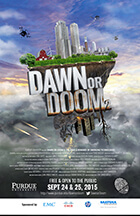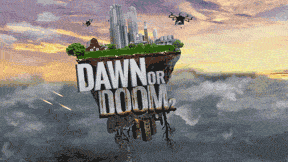Dawn or Doom2 releases full speaker list
September 15, 2015
 |
Download Image |
WEST LAFAYETTE, Ind. – More than 20 speakers will address the role of technologies in our lives in the free, public event at Purdue University, "Dawn or Doom2: the Risks and Rewards of Emerging Technologies."
Gerry McCartney, Purdue's CIO, vice president for information technology, and Oesterle Professor of Technology, says the conference helps the university community to talk about the societal effects of technology.
"The important questions about emerging technologies, such as what role they should play in our lives and whether there are risks that need to be overcome can sometimes be ignored in our day-to-day rush to reap the benefits," McCartney said. "Dawn or Doom is meant to to spark conversations that continue throughout the academic year.
"Thanks to support from EMC2, Cisco, HP, and Matrix Integration, we are able to present this free event without funding from the university general fund."
The conference is being held Thursday and Friday, Sept. 24 and 25, in Purdue's Stewart Center. Free parking is available to campus guests who pre-register for the conference at the website http://www.purdue.edu/dawnordoom/ . Speaker biographies and presentation abstracts are available at the website.
Keynote speakers:
Barton Gellman, Pulitzer Prize recipient, author. "The Snowden effect."
Xuedong Huang, Research Distinguished Engineer, chief research scientist, Microsoft. "Progress and impact of understanding spoken language."
Steve Lohr, reporter, The New York Times, and author. "Data-ism: the revolution transforming decision making, consumer behavior, and almost everything else."
"Data Science, Privacy and Surveillance" track
Stephen J. Elliott, associate professor Purdue Polytechnic Institute. "Goodbye passwords."
Mohammad Rahman, associate professor of management. "Our new realities: omnichannel shopping and the concierge model."
Marcus Rogers, professor and department head, Purdue Polytechnic Institute. "The rise of the autonomous cyber criminal."
Kathryn C. Seigfried-Spellar, associate professor, Purdue Polytechnic Institute.
Eugene H. Spafford, professor, Purdue Polytechnic Institute. "Balancing privacy and surveillance."
 |
"Technology Policy and Legislation in a Giga-speed World" track
Patricia Boling, Purdue associate professor of political science. "On feeding the 10 billion."
J. Eric Dietz, professor Purdue Polytechnic Institute. "Where does sacrificing liberty for security exceed our limits?"
Margot Kaminski, assistant professor, The Ohio State University Moritz College of Law. "Drone videos: surveillance or speech?"
Bret Swanson, president, Entropy Economics, Entropy Capital. "Technology policy."
"Space Travel and Exploration" track
Barrett S. Caldwell, professor of industrial engineering and aeronautics and astronautics. "Being Martian."
Jocelyn Dunn, chief scientist, Hawaii Space Exploration Analog Simulation. "Health and stress monitoring through a long-duration simulated Mars mission."
Briony Horgan, assistant professor, Purdue Earth, Atmospheric, and Planetary Sciences. "Roving Mars: NASA's search for life on the red planet."
Dr. David Wolf, entrepreneur, inventor, NASA astronaut. "No truce at 5:00."
"Advanced Manufacturing, Artificial Intelligence, and Robotics" track
Lance Duerfahrd, associate professor, director of Purdue's Film and Video Studies Program. "One screen over the other: the war between the iPhone and the cinema."
Gerhard Klimeck, professor of Electrical and Computer Engineering; Director of the Network for Computational Nanotechnology. "Mythbusting nanotechnology knowledge transfer through novel cyberinfrastucture."
Eric Matson, associate professor, Purdue Polytechnic Institute; director, Rice Research Center. "Unmanned aircraft systems - is the sky really falling?"
Zygmunt Pizlo, professor of mathematical and computational cognitive science. "Symmetry provides a Turing-type test for 3D vision."
Juan Wachs, associate professor, Purdue College of Industrial Engineering. "Wisdom in our fingers - or how embodied interaction can shape future work."
"Writing About Technology" panel discussion
Jennifer Bogo, executive editor, Popular Science
Ben Gruber, science and environment reporter, Reuters.
Torie Bosch, "Future Tense" editor, Slate
Steve Lohr, technology reporter, The New York Times
The evening before the conference, a free movie showing of "Back to the Future," will be held on the lawn of the Purdue Memorial Union at 7:30 p.m., Wednesday, Sept. 23.
Writer: Steve Tally, 765-494-9809, tally@purdue.edu, Twitter: sciencewriter
Source: Gerry McCartney, 765-496-2270, mccart@purdue.edu, Twitter: @gerrymccartney
An animation available at https://www.purdue.edu/uns/images/2015/dawn.gif

